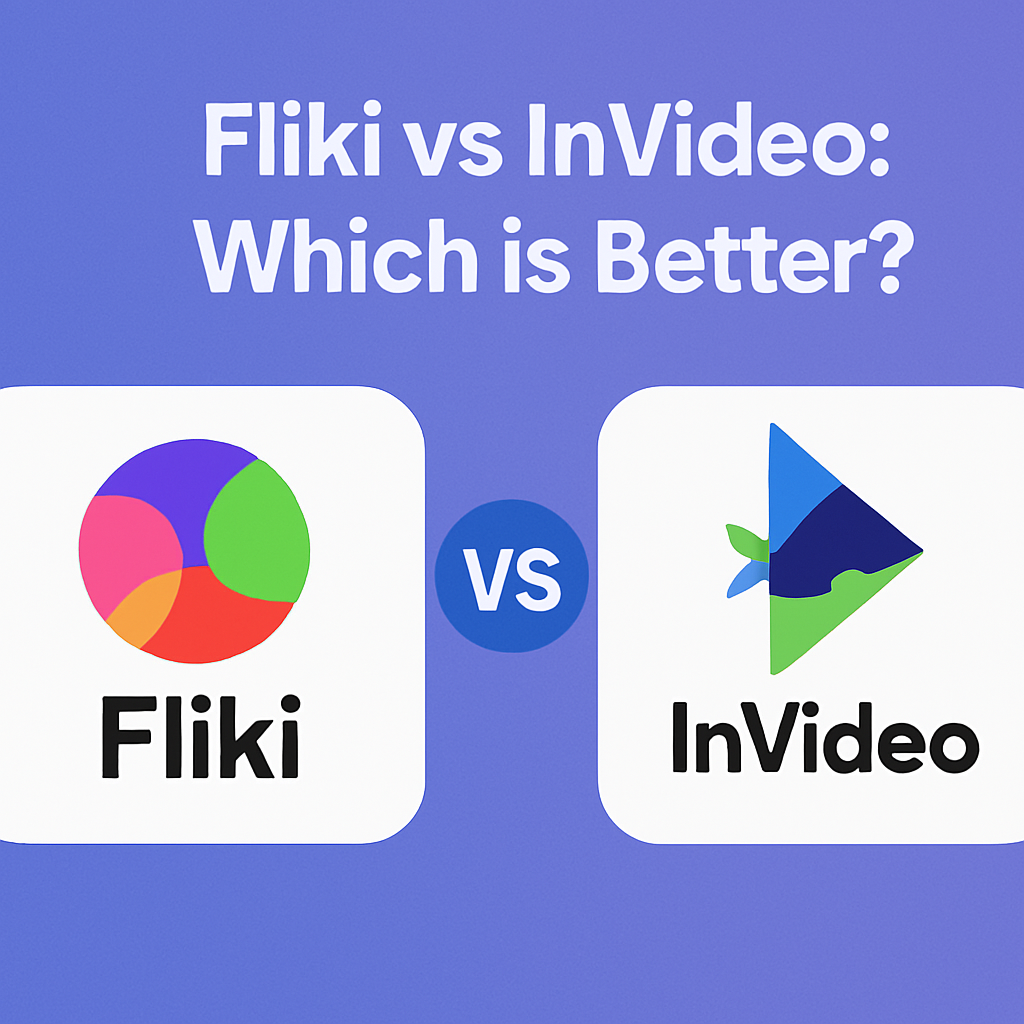Choosing the right video editing tool can feel overwhelming. With so many platforms promising fast results, it’s hard to know where to start. Two standout options—Fliki and InVideo—offer AI-driven solutions to simplify content creation. But which one aligns with your goals?
This guide breaks down their strengths, from user experience to advanced features. Fliki shines in transforming text into polished videos, using lifelike AI voices and an intuitive interface. fliki ai vs invideo – Meanwhile, InVideo provides a massive library of templates and tools for creators who want granular control over their projects.
Whether you’re crafting social media clips, tutorials, or marketing content, your choice depends on priorities like speed, quality, and budget. Both platforms cater to different needs, so understanding their core offerings is key.
Key Takeaways
- Fliki excels at text-to-video conversion with realistic AI voiceovers.
- InVideo offers a broader range of templates and editing flexibility.
- Ease of use varies: Fliki prioritizes simplicity, while InVideo supports complex edits.
- Export quality differs, with InVideo providing higher-resolution outputs.
- Pricing models may influence your decision based on project scale.
Overview of Video Editing Platforms
AI-driven platforms are reshaping how we produce video content. Over the past decade, editing software has shifted from complex desktop apps to cloud-based tools powered by automation. This evolution lets creators focus on storytelling, not technical hurdles.
Background and Market Trends
Video creation is now a cornerstone of digital marketing. Over 80% of businesses use it to engage audiences, fueled by AI innovations that simplify workflows. Social media’s demand for bite-sized clips has made intuitive tools essential.
Free plans lower entry barriers, while paid upgrades unlock premium assets. Platforms now balance ease with depth, catering to casual users and professionals alike. Features like auto-captioning and template libraries save hours, letting creators scale output without sacrificing quality.
Introduction to Key Platforms
Two leaders stand out in this space. One excels at transforming text into videos using lifelike voiceovers—ideal for repurposing blogs or scripts. The other offers a vast template collection and granular control, appealing to brands needing polished visuals.
| Feature | Platform A | Platform B |
|---|---|---|
| Core Strength | Text-to-video conversion | Template diversity |
| Pricing Tier | Free + $15/month | Free + $20/month |
| Best For | Quick social media clips | Custom marketing campaigns |
Both tools adapt to market needs but serve distinct goals. Choosing depends on whether speed or customization matters most for your projects.
fliki vs invideo: Feature and Pricing Comparison
Feature sets and pricing models shape the ideal choice for creators. Let’s explore how these platforms differ in functionality and value.
Core Features Breakdown
One platform excels with AI-driven tools like voice cloning and instant text-to-video conversion. This makes it ideal for rapid content generation. Users can transform blog posts into narrated clips in minutes.
The other offers advanced editing options, including layer masking and frame-by-frame adjustments. Its template library spans 5,000+ designs, catering to brands needing polished visuals. Audio enhancements like noise reduction further refine projects.
“Templates save time, but AI automation redefines what’s possible for solo creators.”
Performance and Export Quality
Export resolutions vary significantly. While one supports HD outputs, the other delivers crisp 4K renders—crucial for professional campaigns. Buffer-free previews ensure smooth editing, even with complex timelines.
| Feature | Platform A | Platform B |
|---|---|---|
| Max Resolution | 1080p | 4K |
| Starting Price | $15/month | $20/month |
| Standout Asset | 80+ AI voices | 5,000+ templates |
Customer support also differs. One provides 24/7 live chat, while the other relies on community forums. Budget-conscious users often prefer the lower-tier plan, though heavy editors may justify the upgrade.
User Experience and Interface Insights
A clutter-free interface empowers creators to focus on content, not buttons. Both platforms prioritize accessibility but take different approaches to design philosophy. Let’s explore how their layouts and guidance systems shape the editing journey.
Navigating the User Interface
One tool features a minimalist dashboard with drag-and-drop simplicity. Key actions like adding text or adjusting timelines are visually prominent, reducing guesswork. Collaboration features appear front-and-center, letting teams comment directly on projects.
The other platform groups advanced tools into expandable menus. While this keeps the workspace tidy, new users might hunt for effects or transitions. Both support responsive design, adapting smoothly to phone and desktop screens.
“I finished my first video in 20 minutes—no tutorials needed.”
Ease of Use for Beginners
First-time creators praise one interface for its logical flow. Color-coded tabs and tooltips guide every step, from importing media to exporting final cuts. fliki vs invideo ai The quality of in-app tutorials also reduces the learning curve.
Meanwhile, the other platform’s depth can overwhelm novices. Its template library—though vast—requires familiarity with layering and timeline editing. Still, both platforms offer:
- Real-time previews for instant feedback
- Contextual help menus for complex tasks
- Progress-saving auto-backups
Efficiency thrives where design meets intention. Choosing between simplicity and granular control depends on your comfort with creative software.
AI-Powered Capabilities and Automation
Modern creators demand speed without sacrificing quality—AI delivers both. Platforms now analyze scripts, suggest visuals, and even clone voices to streamline workflows. This shift lets anyone produce studio-grade content without technical expertise.
Text-to-Video and Voice Cloning
One tool transforms blog posts into narrated videos using 80+ natural-sounding voices. It supports 75 languages, perfect for global campaigns. “I turned a newsletter into a TikTok series in 10 minutes,” shares a social media manager. Voice cloning adds brand consistency, replicating tones for tutorials or ads.
Another platform offers basic text-to-video but focuses on manual adjustments. While effective, it lacks the same adaptive intelligence for multilingual projects.
Intelligent Suggestions and Automated Editing
AI now curates music tracks and applies transitions based on content mood. One system analyzes scene length to recommend pacing adjustments. This cuts editing time by 40% for social media creators pumping out daily clips.
| Feature | AI Platform | Standard Tool |
|---|---|---|
| Auto-Captioning | Context-aware | Manual placement |
| Music Matching | Emotion-based | Generic playlists |
| Output Speed | 2x faster | User-dependent |
Automated rendering ensures consistent video creation quality across batches. While both tools help create videos, AI-driven suggestions let beginners compete with seasoned editors. The result? More time for storytelling, less for button-clicking.
Customization, Templates, and Design Options
Customization transforms templates into brand stories. Both platforms let users adapt designs to their unique style, but their approaches differ. One focuses on ready-made frameworks, while the other prioritizes AI-enhanced personalization.
Diverse Template Libraries
One service offers over 5,000 templates sorted by industry—think social media reels, product demos, or educational explainers. Filters help users narrow choices by duration, aspect ratio, or theme in seconds. The other provides fewer templates but adds dynamic AI elements, like auto-generated scenes matching your script.
“I found templates for healthcare webinars and TikTok ads in the same place—it cut my search time in half.”
Branding and Personalization Features
Consistency matters. One platform lets you save brand colors, fonts, and logos for one-click application. Voice cloning ensures your tutorials or ads always sound on-brand. The other includes:
- Animated text overlays synced to voice pacing
- Custom watermarking for every export
- Music tracks that adjust to video length automatically
| Feature | Platform A | Platform B |
|---|---|---|
| Stock Media | 3M+ assets | AI-generated visuals |
| Brand Kits | Unlimited | 5 kits/month |
| Text-to-Speech | 20 voices | 80+ dialects |
While one excels in media variety, the other streamlines text-to-speech workflows. Both enable polished videos in under 10 minutes, whether you’re crafting corporate training or Instagram Stories.
Cost, Value, and Support Considerations
Budget and support shape long-term success in video editing. Whether you’re a solopreneur or part of a team, understanding pricing tiers and help resources ensures smooth creation workflows. Let’s explore how two leading platforms balance affordability with assistance.
Affordable Pricing Structures and Plans
One tool starts at $15/month, offering HD exports and access to 80+ AI voices across 75 languages. Its free plan includes basic text-to-video features—ideal for testing core functions. The other charges $20/month for 4K rendering and priority support, appealing to brands needing premium outputs.
Mid-tier plans unlock advanced assets:
- Custom brand kits with logos and color palettes
- Commercial licenses for stock media
- Collaboration tools for team projects
Responsive Customer and Community Support
Quick help saves time during tight deadlines. One platform provides 24/7 live chat, resolving issues in under 10 minutes. The other relies on an active user forum, where creators share template hacks and workflow tips.
“Their support team fixed my export error while I was still on lunch break—game-changer for weekly content schedules.”
Both offer video tutorials tailored to their interface, helping users master transitions or voice cloning. Transparent pricing and reliable assistance let creators focus on storytelling, not software struggles.
Conclusion
Video creators today face a crucial decision: prioritize speed or precision in their editing suite. For AI-driven generation and rapid results, one platform stands out with lifelike voiceovers and text-to-video magic. The other excels in detailed editing and 4K exports—ideal for polished campaigns.
Your choice hinges on workflow needs. Those valuing simplicity and affordable innovation will lean toward streamlined solutions. Teams requiring granular control might prefer comprehensive toolkits with premium templates.
Free trials let you test-drive both approaches risk-free. Experience how each handles your content generation rhythm—whether crafting quick social clips or cinematic sequences.
Ultimately, the best tool aligns with your creative goals. Need daily video generation at scale? Prioritize automation. Building frame-perfect visuals? Opt for precision editing. Both empower storytellers but serve different chapters of the creation process.
Ready to transform your generation of videos? Start experimenting today—and share your experiences below. What features matter most in your video generation journey?

